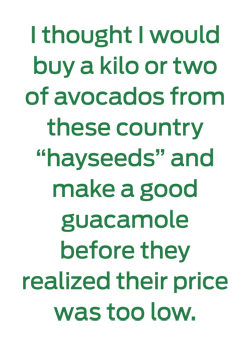
I am frequently asked what folks can do to become better investors. My answer is to urge more learning about the economics underlying your investments. Of the many economic concepts that will bring greater riches with fuller understanding, one stands out: In a well-functioning marketplace, there is no such thing as a bargain. Understanding this principle can enormously empower those wishing to up their investing game.
The following account helps to illuminate this universal truth about how markets work: As a young man traveling in Mexico, I loved going to el mercado (the marketplace). Walking among the different kinds of produce, meats, fish, edible bugs, strange spices, and, of course, various powdered moles and sauces was a delight for the senses.
One day I focused on avocados, with more than a dozen stalls featuring the delicious, creamy green fruit. All the vendors were charging about the equivalent of one U.S. dollar per kilo, with little variation. It was early morning when people from a remote village arrived with a small cart full of similar avocados and a handwritten sign announcing their price: 50 cents per kilo. They had four or five dozen avocados, a fraction of the quantity offered by the established avocado sellers. I thought I would buy a kilo or two from these country “hayseeds” and make a good guacamole before they realized their price was too low. Then I remembered a pressing errand. Since few shoppers were in the marketplace, and would not be until the lunchtime rush, I left, expecting to buy avocados on my return.
When I got back 30 minutes later, the village traders and their avocados were gone. With few shoppers around, I wondered where the cheap avocados went. Mystified, I asked an older merchant. The answer, of course, is that established sellers bought the below-market avocados in a single purchase. After all, the other vendors were experts in avocado pricing. So the incorrectly priced avocados quickly disappeared (but remained in the marketplace).

While I didn’t get cheap avocados that day, I did get a great economics lesson. In a well-functioning marketplace mispriced items disappear almost instantly. The market, by its very nature, drives out bargains. In effect, there are no such bargains to be found.
This is not to say prices never drop. If, for example, a bumper crop of avocados caused a far greater supply than the demand, we expect the price to fall. Rather, the idea is that the tension between buyers and sellers ensures the proper price. It is almost impossible for a speculator to find underpriced avocados that can be turned around for an easy profit.
The idea that everything in the market is correctly priced is counterintuitive and hard to get one’s head around. It is, however, a critical element of the rational market hypothesis that all serious economists respect. Properly functioning markets, with high liquidity and strong flows of information, come close to pricing everything correctly. Without this understanding, it is almost impossible to comprehend how these markets operate.
Financial salesmen promising to lead you to investment bargains are flying in the face of what all economists know. They are selling you something, that, for the most part, cannot be done. The talent they claim for spotting underpriced assets does not really exist. Understanding there are no such bargains can save you a great deal of money over time. With those savings, you can afford a lot of avocados.
Become a Saturday Evening Post member and enjoy unlimited access. Subscribe now




Comments
I noticed that the author concentrated on a specific vegetable. Lesson also points out ; concentrate on a small section of stocks , e.g technology, banking or energy. The market is too big to follow everything.
Nice article about how to be good investor